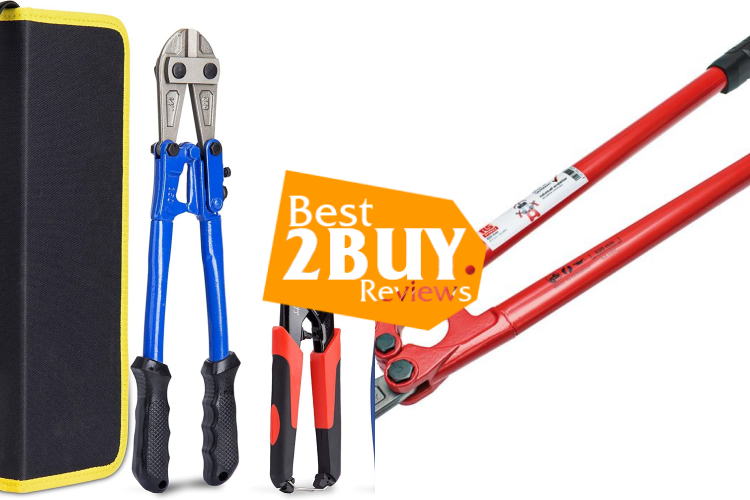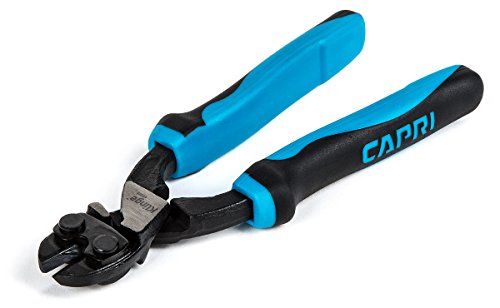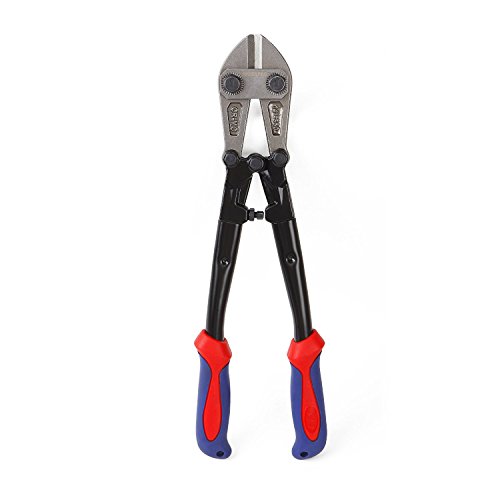How to Choose the Bolt Cutters
- 1. What is Bolt cutter?
- 2. Size of bolt cutters
- 3. What are bolt cutters used for?
- 4. Types of Bolt Cutters
- 4.1. Standard Bolt Cutters
- 4.2. Compact Bolt Cutters
- 4.3. Center Cut Bolt Cutters
- 4.4. Clipper Cut Bolt Cutters
- 4.5. Shear Cut Bolt Cutters
- 4.6. Power Bolt Cutters
- 4.7. Ratcheting Bolt Cutters
- 4.8. Fencing Pliers with Bolt Cutter
- 5. Benefits of Bolt Cutters
- 5.1. Cutting Strength
- 5.2. Versatility
- 5.3. Speed and Efficiency
- 5.4. Ease of Use
- 5.5. Minimal Damage to Surroundings
- 5.6. Emergency and Rescue Situations
- 5.7. Portability
- 5.8. Durable Construction
- 5.9. Reduced Physical Strain
- 5.10. Cost-Effective
- 6. How to choose Bolt Cutters?
- 6.1. Identify Your Cutting Needs:
- 6.2. Select the Right Size:
- 6.3. Consider Cutting Capacity:
- 6.4. Choose the Jaw Type:
- 6.5. Check Material and Construction:
- 6.6. Evaluate Ergonomics:
- 6.7. Think About Portability:
- 6.8. Research Brands and Reviews:
- 6.9. Set a Budget:
- 6.10. Consider Safety:
- 6.11. Try Before Buying (If Possible):
- 7. In conclusion
What are Bolt cutters?
Bolt cutters are a type of hand tool designed to cut through various types of materials, primarily metal bolts, chains, wires, and other hardened materials. They consist of long handles, often with rubber or plastic grips for better control and comfort, and a pair of strong, forged steel jaws with sharp cutting edges.

The handles provide leverage, allowing the user to apply significant force to the jaws, which in turn exert pressure on the material being cut. Bolt cutters are commonly used in situations where conventional tools like saws or pliers would be ineffective due to the material's strength or thickness.
Size of bolt cutters
These tools come in various sizes, ranging from compact models suitable for cutting thinner wires or smaller bolts, to heavy-duty versions capable of cutting through thick chains or large metal bars. The size you choose depends on the specific application and the thickness of the material you need to cut.
What are bolt cutters used for?
Bolt cutters are commonly used in construction, automotive repair, manufacturing, locksmithing, and other industries where cutting through metal or heavy materials is required. They're also useful for emergency situations, such as rescuing people from trapped vehicles.
When using bolt cutters, it's important to wear appropriate safety gear, such as gloves and safety glasses, to protect yourself from potential flying debris or sharp edges. It's also advisable to follow the manufacturer's guidelines and recommendations for proper usage and maintenance to ensure the longevity of the tool.
Types of Bolt Cutters
There are several types of bolt cutters designed for different purposes and varying levels of cutting strength. Here are some common types of bolt cutters:
Standard Bolt Cutters
These are the most common type of bolt cutters and are used for general cutting tasks. They come in various sizes, usually ranging from about 8 to 48 inches in length. Standard bolt cutters are suitable for cutting bolts, chains, wires, and other similar materials.
Compact Bolt Cutters
These are smaller and more portable versions of standard bolt cutters. They are designed for cutting thinner materials like wires, nails, and smaller bolts. Compact bolt cutters are handy for situations where space is limited or for tasks that don't require heavy-duty cutting.
Center Cut Bolt Cutters
Center cut bolt cutters have jaws that are positioned in the center of the tool's head. This design allows for better cutting efficiency and reduced effort when cutting through larger bolts or chains.
Clipper Cut Bolt Cutters
Clipper cut bolt cutters have offset jaws, which means one jaw is positioned slightly forward of the other. This design provides greater cutting leverage, making them suitable for cutting thick materials or for applications where more force is needed.
Shear Cut Bolt Cutters
Shear cut bolt cutters have a scissor-like cutting action. They are designed for cutting softer materials like mesh, wire cloth, or small cables. These cutters produce clean cuts with minimal distortion.
Power Bolt Cutters
Power bolt cutters are motorized or hydraulic tools that are capable of cutting through extremely thick and heavy materials with minimal manual effort. They are often used in industrial and heavy construction applications.
Ratcheting Bolt Cutters
Ratcheting bolt cutters have a mechanism that allows the user to cut through materials in incremental steps, which can be useful when dealing with materials that are too tough for a single cut. The ratcheting action helps distribute the force more evenly.
Fencing Pliers with Bolt Cutter
Some multi-purpose fencing pliers come with a built-in bolt cutter feature. These tools are commonly used in agriculture and fencing applications for tasks such as cutting wires, nails, and small bolts.
When selecting a type of bolt cutter, consider the specific materials you'll be cutting, the thickness of those materials, and the amount of force required. It's important to choose the right tool for the job to ensure efficient and safe cutting.
Benefits of Bolt Cutters
Bolt cutters offer several benefits due to their unique design and capabilities. Here are some of the key advantages of using bolt cutters:
Cutting Strength
Bolt cutters are designed to cut through tough and hardened materials, such as bolts, chains, wires, and padlocks. Their strong, sharp jaws and leverage provide the cutting force needed to tackle materials that might be difficult or impossible to cut with other tools.
Versatility
Bolt cutters are versatile tools that can be used in various industries and applications. From construction and automotive repair to manufacturing and emergency situations, bolt cutters prove useful in a wide range of scenarios.
Speed and Efficiency
When compared to manual hacksaws or other cutting tools, bolt cutters can significantly speed up the cutting process. Their powerful cutting action allows for quick and efficient material removal.
Ease of Use
Bolt cutters require less skill and technique compared to some other cutting tools. With the right tool size and proper positioning, you can easily cut through various materials without extensive training.
Minimal Damage to Surroundings
Bolt cutters provide a controlled and focused cutting action, reducing the risk of damaging surrounding surfaces or materials. This can be particularly important in situations where precision is necessary.
Emergency and Rescue Situations
Bolt cutters are valuable tools for emergency responders, firefighters, and law enforcement personnel. They can quickly cut through locks, chains, and barriers to access areas or rescue individuals trapped in vehicles or confined spaces.
Portability
Many bolt cutters are relatively compact and lightweight, making them easy to transport and use in different locations. This portability is especially useful in fieldwork or situations where mobility is important.
Durable Construction
Quality bolt cutters are built to withstand heavy use and demanding conditions. They are typically constructed with robust materials, ensuring longevity and reliable performance over time.
Reduced Physical Strain
The leverage provided by the long handles of bolt cutters reduces the physical effort required to cut through materials. This can help prevent user fatigue and strain during extended cutting tasks.
Cost-Effective
Bolt cutters are generally affordable tools, especially considering the tasks they can accomplish. They provide good value for the cutting capabilities they offer.
While bolt cutters have many benefits, it's important to use them responsibly and safely. Always follow the manufacturer's guidelines and recommended usage practices, and wear appropriate safety gear to protect yourself from potential hazards during cutting operations.
How to choose Bolt Cutters?
Choosing the right bolt cutters involves considering several factors to ensure that the tool meets your specific needs. Here's a step-by-step guide to help you make an informed decision:
Identify Your Cutting Needs:
Determine the types of materials you'll be cutting and their thickness. Different bolt cutters are designed for various materials, so knowing your specific requirements will help you choose the right tool.
Select the Right Size:
Bolt cutters come in various sizes, typically measured by their length. Larger bolt cutters provide more leverage and cutting power, but they might be bulkier and heavier. Smaller cutters are more portable but may not be suitable for heavy-duty tasks. Choose a size that balances your cutting needs with your comfort and maneuverability.
Consider Cutting Capacity:
Look at the maximum diameter of material that a particular bolt cutter can handle. This will ensure that the tool is capable of cutting through the materials you frequently work with.
Choose the Jaw Type:
Different jaw designs provide varying levels of cutting efficiency and leverage. Depending on your needs, you might choose between center cut, clipper cut, or shear cut bolt cutters. Consider the type of materials you'll be cutting to determine the most suitable jaw design.
Check Material and Construction:
Look for bolt cutters made from high-quality materials like forged and heat-treated steel. These will be more durable and able to withstand heavy use. Consider the construction of the handles, grips, and pivot points for added comfort and reliability.
Evaluate Ergonomics:
Handles with ergonomic grips can reduce hand fatigue during prolonged use. Choose bolt cutters that have comfortable handles and a design that minimizes strain on your hands and wrists.
Think About Portability:
If you need to carry your bolt cutters to different locations, consider their weight and size. Compact models are more portable, while larger ones offer more cutting power.
Research Brands and Reviews:
Look for reputable brands that are known for producing high-quality tools. Reading reviews from other users can provide insights into the performance, durability, and user experience of specific bolt cutter models.
Set a Budget:
Determine how much you're willing to invest in a bolt cutter. While quality is important, there are options available at various price points. Find a balance between your budget and the features you need.
Consider Safety:
Safety is paramount when using any cutting tool. Ensure that the bolt cutters have safety features, and always wear appropriate personal protective equipment (PPE), such as gloves and safety glasses, when using the tool.
Try Before Buying (If Possible):
If possible, visit a hardware store or supplier and physically handle different bolt cutters to see which ones feel comfortable and meet your needs. This hands-on experience can help you make a more informed decision.
Remember that the right bolt cutter for you will depend on the specific tasks you'll be performing. Taking the time to evaluate your requirements and researching different options will help you choose a bolt cutter that provides reliable performance and durability.
In conclusion
With above information and our list top of bolt cutters which is popular and top reviewing, we hope that you can choose easily suitable bolt cutters for yourself. Reading carefully our recommendation and user’s evalation, you will find best bolt cutters. Good luck!
I’m David Lee - editor at best2buy.reviews. If you need our support. Kindly comment below. I’m always available to response you.











